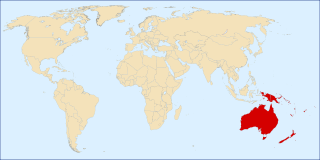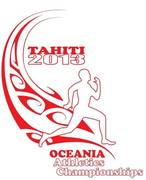
Pacific Islanders, Pasifika, Pasefika, Pacificans or rarely Pacificers are the peoples of the Pacific Islands. As an ethnic/racial term, it is used to describe the original peoples—inhabitants and diasporas—of any of the three major subregions of Oceania.

The OFC Nations Cup is the primary association football competition contested by the senior men's national teams of the members of the Oceania Football Confederation (OFC), determining the continental champion of Oceania. The winning team became the champion of Oceania and until 2016 qualified for the FIFA Confederations Cup.

Pacific coast may be used to reference any coastline that borders the Pacific Ocean.

The Asia–Pacific (APAC) is the region of the world adjoining the western Pacific Ocean. The region's precise boundaries vary depending on context, but countries and territories in Australasia, East Asia, and Southeast Asia are often included. In a wider context, Central Asia, North Asia, the Pacific Islands, South Asia, West Asia, and even Pacific-adjoining countries in the Americas can be included. For example, the Asia-Pacific Economic Cooperation (APEC) includes five countries in the New World. The term has become popular since the late 1980s in commerce, finance, and politics. Despite the heterogeneity of the regions' economies, most individual nations within the zone are emerging markets experiencing rapid growth. Sometimes, the notion of "Asia–Pacific excluding Japan" (APEJ) is considered useful.

The Pacific Games, is a continental multi-sport event held every four years among athletes from Oceania. The inaugural Games took place in 1963 in Suva, Fiji, and most recently in 2023 in Honiara, Solomon Islands. The Games were called the South Pacific Games from 1963 to 2007. The Pacific Games Council (PGC) organises the Games and oversees the host city's preparations. Athletes with a disability are included as full members of their national teams. In each sporting event, gold medals are awarded for first place, silver medals are awarded for second place, and bronze medals are awarded for third place.

The Niue Island national rugby union team is the national team of the third tier rugby union playing nation of Niue Island. The team first started playing in 1983 in mainly competes in the Oceania Cup, which it won in 2008. Rugby union in Niue Island is administered by the Niue Rugby Football Union.
There are six monarchies in Oceania where supreme power resides with an individual hereditary head, who is recognised as the head of state. Each is a constitutional monarchy, wherein the sovereign inherits his or her office, usually keeps it until death or abdication, and is bound by laws and customs in the exercise of their powers. Five of these independent states share King Charles III as their respective head of state, making them part of a global grouping known as the Commonwealth realms; in addition, all monarchies of Oceania are members of the Commonwealth of Nations. The only sovereign monarchy in Oceania that does not share a monarch with another state is Tonga. Australia and New Zealand have dependencies within the region and outside it, although five non-sovereign constituent monarchs are recognized by New Zealand, Papua New Guinea and France.

The following outline is provided as an overview and topical guide to Oceania.
The Oceania Table Tennis Federation (OTTF) is a table tennis organization founded on 1 June 1977, recognized by International Table Tennis Federation (ITTF) as its continental federation in Oceania. Discussions began at the Commonwealth Table Tennis Championships held in Melbourne, 1975. Seven foundation members were New Zealand, Australia, Guam, Papua New Guinea, Fiji, New Caledonia and Tahiti.
The decolonisation of Oceania occurred after World War II when nations in Oceania achieved independence by transitioning from European colonial rule to full independence.

Oceania is a region centered on the islands of the tropical Pacific Ocean. Conceptions of what constitutes Oceania vary, with it being defined in various ways, often geopolitically or geographically. In the geopolitical conception used by the United Nations, International Olympic Committee, and many atlases, the Oceanic region includes Australia and the nations of the Pacific from Papua New Guinea east, but not the Malay Archipelago or Indonesian New Guinea. The term is sometimes used more specifically to denote Australasia as a geographic continent, or biogeographically as a synonym for either the Australasian realm or the Oceanian realm.
The 1994 Oceania Athletics Championships were held in Auckland, New Zealand, between February 23–26, 1994.

The 2013 Oceania Athletics Championships were held at the Stade Pater Te Hono Nui in Papeete, French Polynesia, between June 3–5, 2013. The event was held jointly with the 2013 Oceania Youth Athletics Championships, and there were also exhibition events for masters, athletes with a disability and children. Detailed reports on a day by day basis were given.
The following is a list of all reported tropical cyclones within the South Pacific Ocean to the east of 160°E after the start of World War II in September 1939 and before the start of the 1950s decade.
The following lists events that happened during 2020 in Oceania.
List of events that happened during 2021 in Oceania.








